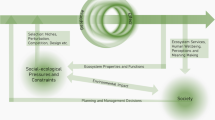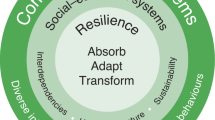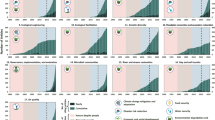Abstract
Human behaviour is of profound significance in shaping pathways towards sustainability. Yet, the approach to understanding human behaviour in many fields remains reliant on overly simplistic models. For a better understanding of the interface between human behaviour and sustainability, we take work in behavioural economics and cognitive psychology as a starting point, but argue for an expansion of this work by adopting a more dynamic and systemic understanding of human behaviour, that is, as part of complex adaptive systems. A complex adaptive systems approach allows us to capture behaviour as ‘enculturated’ and ‘enearthed’, co-evolving with socio–cultural and biophysical contexts. Connecting human behaviour and context through a complex adaptive systems lens is critical to inform environmental governance and management for sustainability, and ultimately to better understand the dynamics of the Anthropocene itself.
This is a preview of subscription content, access via your institution
Access options
Access Nature and 54 other Nature Portfolio journals
Get Nature+, our best-value online-access subscription
$29.99 / 30 days
cancel any time
Subscribe to this journal
Receive 12 digital issues and online access to articles
$119.00 per year
only $9.92 per issue
Buy this article
- Purchase on Springer Link
- Instant access to full article PDF
Prices may be subject to local taxes which are calculated during checkout



Similar content being viewed by others
References
Steffen, W. et al. Planetary boundaries: guiding human development on a changing planet. Science 347, 1259855 (2015).
Crutzen, P. J. Geology of mankind. Nature 415, 23 (2002).
Reid, W. V. et al. Earth system science for global sustainability: grand challenges. Science 330, 916–917 (2010).
World Development Report 2015: Mind, Society, and Behavior (World Bank, 2015).
North, D. C. Institutions. J. Econ. Perspect. 5, 97–112 (1991).
Holland, J. H. Hidden Order: How Adaptation Builds Complexity (Addison-Wesley, 1995).
Levin, S. A. Ecosystems and the biosphere as complex adaptive systems. Ecosystems 1, 431–436 (1998).
Levin, S. et al. Social-ecological systems as complex adaptive systems: modeling and policy implications. Environ. Dev. Econ. 18, 111–132 (2013).
Folke, C., Biggs, R., Norström, A. V., Reyers, B. & Rockström, J. Social-ecological resilience and biosphere-based sustainability science. Ecol. Soc. 21, 41 (2016).
Schlüter, M. et al. A framework for mapping and comparing behavioural theories in models of social-ecological systems. Ecol. Econ. 131, 21–35 (2017).
van den Bergh, J. C. J. M., Ferrer-i-Carbonell, A. & Munda, G. Alternative models of individual behaviour and implications for environmental policy. Ecol. Econ. 32, 43–61 (2000).
Hoff, K. & Stiglitz, J. E. Striving for balance in economics: towards a theory of the social determination of behavior. J. Econ. Behav. Organ. 126, 25–57 (2016).
Arthur, W. B. in Complexity and the Economy (ed. Arthur, W. B.) Ch. 1 (Oxford Univ. Press, 2014).
Conlisk, J. Why bounded rationality? J. Econ. Lit. 34, 669–700 (1996).
Gigerenzer, G. Rationality for Mortals: How People Cope with Uncertainty (Oxford Univ. Press, 2008).
Mullainathan, S. & Thaler, R. Behavioral Economics Working Paper No. 00-27 (MIT Department of Economics, 2000); https://doi.org/10.2139/ssrn.245828
Schill, C. Human Behaviour in Social-Ecological Systems: Insights from Economic Experiments and Agent-based Modelling. PhD thesis, Stockholm Univ. (2017); https://go.nature.com/315vZ5g
Fehr-Duda, H. & Fehr, E. Game human nature. Nature 530, 413–415 (2016).
Simon, H. A. A behavioral model of rational choice. Q. J. Econ. 69, 99–118 (1955).
Kahneman, D. & Tversky, A. Prospect theory: an analysis of decision under risk. Econometrica 47, 263–292 (1979).
Ellsberg, D. Risk, ambiguity, and the savage axioms. Q. J. Econ. 75, 643–669 (1961).
Loewenstein, G. F., Weber, E. U., Hsee, C. K. & Welch, N. Risk as feelings. Psychol. Bull. 127, 267–286 (2001).
Hume, D. A Treatise of Human Nature (1739) (ed. Selby-Bigge, L. A.) (Clarendon Press, 1896).
Thaler, R. H. & Shefrin, H. M. An economic theory of self-control. J. Polit. Econ. 89, 392–406 (1981).
Samuelson, W. & Zeckhauser, R. Status quo bias in decision making. J. Risk Uncertain. 1, 7–59 (1988).
Thaler, R. H. & Sunstein, C. R. Nudge: Improving Decisions about Health, Wealth, and Happiness (Yale Univ. Press, 2008).
Gintis, H., Bowles, S., Boyd, R. & Fehr, E. Moral Sentiments and Material Interests: The Foundations of Cooperation in Economic Life (MIT Press, 2005).
Lieberman, M. D. Social: Why Our Brains Are Wired to Connect (Crown Publishers, 2013).
Ostrom, E. A behavioral approach to the rational choice theory of collective action: presidential address, American political science association, 1997. Am. Polit. Sci. Rev. 92, 1–22 (1998).
Kahneman, D., Knetsch, J. L. & Thaler, R. H. Fairness and the assumptions of economics. J. Bus. 59, S285–S300 (1986).
Kocher, M. G., Cherry, T., Kroll, S., Netzer, R. J. & Sutter, M. Conditional cooperation on three continents. Econ. Lett. 101, 175–178 (2008).
Peysakhovich, A., Nowak, M. A. & Rand, D. G. Humans display a ‘cooperative phenotype’ that is domain general and temporally stable. Nat. Commun. 5, 4939 (2014).
DiMaggio, P. & Markus, H. R. Culture and social psychology: converging perspectives. Soc. Psychol. Q. 73, 347–352 (2010).
Triandis, H. C. in Handbook of Cultural Psychology (eds Kitayama, S. & Cohen, D.) 59–76 (Guilford Press, 2007).
Shweder, R. A. & LeVine, R. A. Culture Theory: Essays on Mind, Self and Emotion (Cambridge Univ. Press, 1984).
Markus, H. R. & Kitayama, S. Culture and the self: implications for cognition, emotion, and motivation. Psychol. Rev. 98, 224–253 (1991).
Triandis, H. C. The self and social behavior in differing cultural contexts. Psychol. Rev. 96, 506–520 (1989).
Nisbett, R. E., Peng, K., Choi, I. & Norenzayan, A. Culture and systems of thought: holisitic versus analytic cognition. Psychol. Rev. 108, 291–310 (2001).
Inglehart, R. & Baker, W. E. Modernization, cultural change, and the persistence of traditional values. Am. Sociol. Rev. 65, 19–51 (2000).
Gifford, R. & Nilsson, A. Personal and social factors that influence pro-environmental concern and behaviour: a review. Int. J. Psychol. 49, 141–157 (2014).
Henrich, J. et al. ‘Economic man’ in cross-cultural perspective: behavioral experiments in 15 small-scale societies. Behav. Brain Sci. 28, 795–855 (2005).
Cárdenas, J.-C. et al. Fragility of the provision of local public goods to private and collective risks. Proc. Natl Acad. Sci. USA 114, 921–925 (2017).
Prediger, S., Vollan, B. & Frölich, M. The impact of culture and ecology on cooperation in a common-pool resource experiment. Ecol. Econ. 70, 1599–1608 (2011).
Castillo, D., Bousquet, F., Janssen, M. A., Worrapimphong, K. & Cardenas, J. C. Context matters to explain field experiments: results from Colombian and Thai fishing villages. Ecol. Econ. 70, 1609–1620 (2011).
Swidler, A. Culture in action: symbols and strategies. Am. Sociol. Rev. 51, 273–286 (1986).
Lamont, M., Adler, L., Park, B. Y. & Xiang, X. Bridging cultural sociology and cognitive psychology in three contemporary research programmes. Nat. Hum. Behav. 1, 886–872 (2017).
Davis, T., Hennes, E. P. & Raymond, L. Cultural evolution of normative motivations for sustainable behaviour. Nat. Sustain. 1, 218–224 (2018).
Young, H. P. The evolution of social norms. Annu. Rev. Econ. 7, 359–387 (2015).
Nyborg, K. et al. Social norms as solutions. Science 354, 42–43 (2016).
Uskul, A. K., Kitayama, S. & Nisbett, R. E. Ecocultural basis of cognition: farmers and fishermen are more holistic than herders. Proc. Natl Acad. Sci. USA 105, 8552–8556 (2008).
Talhelm, T. Large-scale psychological rice versus wheat agriculture. Science 344, 603–608 (2014).
Gifford, R. Environmental psychology matters. Annu. Rev. Psychol. 65, 541–579 (2014).
Bratman, G. N. et al. Nature and mental health: an ecosystem service perspective. Sci. Adv. 5, eaax0903 (2019).
Soga, M. & Gaston, K. J. Extinction of experience: the loss of human-nature interactions. Front. Ecol. Environ. 14, 94–101 (2016).
Brondizio, E. S., Ostrom, E. & Young, O. R. Connectivity and the governance of multilevel social-ecological systems: the role of social capital. Annu. Rev. Environ. Resour. 34, 253–278 (2009).
Vitali, S., Glattfelder, J. B. & Battiston, S. The network of global corporate control. PLoS ONE 6, e25995 (2011).
Markus, H. R. & Kitayama, S. Cultures and selves: a cycle of mutual constitution. Perspect. Psychol. Sci. 5, 420–430 (2010).
Boyd, R. & Richerson, P. J. Culture and the Evolutionary Process (Univ. Chicago Press, 1985).
Waring, T. M. et al. A multilevel evolutionary framework for sustainability analysis. Ecol. Soc. 20, 34 (2015).
Gordon, L. et al. Rewiring food systems to enhance human health and biosphere stewardship. Environ. Res. Lett. 12, 100201 (2017).
Henrich, J. P. The Secret of our Success: How Culture is Driving Human Evolution, Domesticating our Species, and Making us Smarter (Princeton Univ. Press, 2017).
Beddoe, R. et al. Overcoming systemic roadblocks to sustainability: the evolutionary redesign of worldviews, institutions, and technologies. Proc. Natl Acad. Sci. USA 106, 2483–2489 (2018).
Schmidt, V. A. Discursive institutionalism: the explanatory power of ideas and discourse. Annu. Rev. Polit. Sci. 11, 303–326 (2008).
Bouchard, G. Social Myths and Collective Imaginaries (Univ. Toronto Press, 2015).
Harari, Y. N. Homo Deus: A Brief History of Tomorrow (Harvill Secker, 2016).
Brockman, J. This Will Make You Smarter: New Scientific Concepts to Improve Your Thinking (Harper Perennial, 2012).
Thibodeau, P. H., Frantz, C. M. P. & Berretta, M. The earth is our home: systemic metaphors to redefine our relationship with nature. Clim. Change 142, 287–300 (2017).
Folke, C. Resilience (republished). Ecol. Soc. 21, 44 (2016).
Henrich, J., Heine, S. J. & Norenzayan, A. Most people are not WEIRD. Nature 466, 29 (2010).
Groeneveld, J. et al. Theoretical foundations of human decision-making in agent-based land use models – a review. Environ. Model. Softw. 87, 39–48 (2017).
Shove, E. Beyond the ABC: climate change policy and theories of social change. Environ. Plan. A 42, 1273–1285 (2010).
Reid, L. & Ellsworth-Krebs, K. Nudge(ography) and practice theories: contemporary sites of behavioural science and post-structuralist approaches in geography? Prog. Hum. Geogr. 43, 295–313 (2019).
Acknowledgements
This Perspective is a product of a series of Behaviour, Economics and Nature (BEN) workshops hosted by the Beijer Institute of Ecological Economics at the Royal Swedish Academy of Sciences. The work has been funded by the Kjell and Märta Beijer Foundation, and the Marianne and Marcus Wallenberg Foundation. We would like to thank S. West and D. Ospina for insightful comments and suggestions on previous drafts.
Author information
Authors and Affiliations
Contributions
C.S., J.M.A., T.L., C.F. and S.P. conceived the idea with input from J.C.C., A.-S.C., M.A.J., J.N. and M.S. C.S., J.M.A. and T.L. led the writing process with input from C.F., S.P., J.C.C., A.-S.C., M.A.J., J.N. and M.S. C.S. and T.L. led the revision with input from J.M.A., C.F., S.P., J.C.C., A.-S.C., M.A.J., J.N. and M.S.
Corresponding author
Ethics declarations
Competing interests
The authors declare no competing interests.
Additional information
Publisher’s note Springer Nature remains neutral with regard to jurisdictional claims in published maps and institutional affiliations.
Rights and permissions
About this article
Cite this article
Schill, C., Anderies, J.M., Lindahl, T. et al. A more dynamic understanding of human behaviour for the Anthropocene. Nat Sustain 2, 1075–1082 (2019). https://doi.org/10.1038/s41893-019-0419-7
Received:
Accepted:
Published:
Issue Date:
DOI: https://doi.org/10.1038/s41893-019-0419-7
This article is cited by
-
Realizing the full potential of behavioural science for climate change mitigation
Nature Climate Change (2024)
-
Policy and market forces delay real estate price declines on the US coast
Nature Communications (2024)
-
Climate change: the next game changer for sport and exercise psychology
German Journal of Exercise and Sport Research (2024)
-
Improving the climate resilience of European cities via socially acceptable nature-based solutions
npj Urban Sustainability (2023)
-
A manifesto for applying behavioural science
Nature Human Behaviour (2023)



